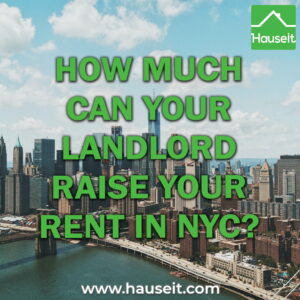How much your landlord can raise your rent in NYC depends on what type of apartment you live in. The first thing you should do is figure out whether you live in a free-market (“unregulated”) apartment or a “regulated” apartment, such as a rent-stabilized or rent-controlled unit.
There is no limit to how much your landlord in NYC can raise your rent in NYC if you live in an “unregulated” (free market) apartment, provided your landlord gives proper notice.
If you live in a “rent stabilized” unit, the allowable annual rent increase is set by the New York City Rent Guidelines Board (NYCRGB).
If you live in a rent controlled NYC apartment, landlords may raise rents the lesser of either: a) the average of the five most recent Rent Guidelines Board annual rent increases for one year renewal leases, or b) 7.5% percent each year until they reach the Maximum Base Rent (MBR) established for your specific apartment.
Click on the sections below to learn more. Tired of renting? Read Hauseit’s comprehensive first-time NYC home buyer’s guide and estimate your buyer closing costs in NYC using Hauseit’s Buyer Closing Cost Calculator. Consider requesting a Hauseit Buyer Closing Credit to save money on your purchase.
Table of Contents:
I live in a free-market NYC apartment. How much can my landlord raise my rent?
There is no limit to how much your landlord in NYC can raise your rent in NYC if you live in an “unregulated”, free market apartment, provided your landlord gives proper notice.
Approximately 937,000 of NYC’s 2.2 million rental properties are unregulated “market rate” apartments, according to the NYC Rent Guidelines Board. This means that there is no regulation with respect to the amount of rent a landlord may charge, the year-over-year rate of increase and whether or not a renewal is even offered.
However, landlords of unregulated units are subject to strict notice periods for rent increases of 5% or more and non-renewals.
Notice periods are mandated by the NY Housing Stability & Tenant Protection Act of 2019 and depend on the length of your lease (or how long you’ve lived in the apartment).
If a landlord does not intend to renew a lease or seeks to intends to raise the rent by more than 5%, the landlord must provide notice as follows:
-
30 days in advance of renewal if a tenant has lived in the apartment less than one year and has less than a 12-month lease
-
60 days in advance for a tenant who has lived in the apartment for one to two years or for a tenant with a lease term of between one and two years
-
90 days for a tenant who has lived in the apartment for more than two years or for a tenant with a lease term of at least two years








These are some great, commonsense ways to building a relationship with anyone, not just your landlord. Hopefully certain, more troublesome tenants are getting the hint that perhaps they should be nice, or at least treat fairly, their landlords especially with articles like https://www.wsj.com/articles/new-york-city-rents-hit-record-highs-amid-nationwide-housing-price-increases-11660219200 coming out about sky high rents in NYC!